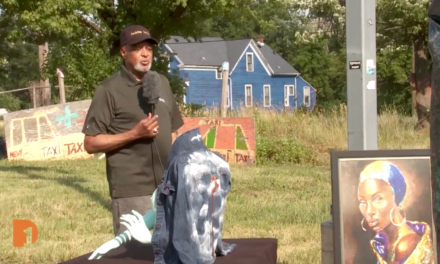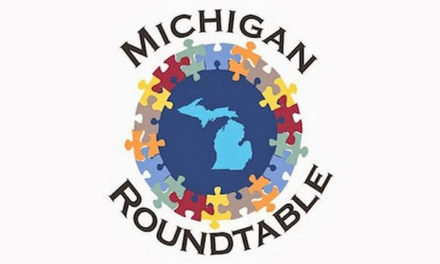So many are stuck inside including seniors and their caregivers. Although seniors are the most vulnerable to COVID-19, they are getting support.
Some comes from the Detroit Area Agency on Aging, looking after many area seniors, maintaining regular contact with many who live alone, bringing them meals – a lot more meals now – in this time of crisis.
One Detroit’s Christy McDonald checks in with the agency’s CEO, Ron Taylor, and clinical director, Sylvia Brown.
Read full transcript
Christy McDonald I want to talk a little bit about our seniors who were watching during the Covid-19 crisis, and joining me now is Ron Taylor. He is the CEO of the Detroit Area Agency on Aging. Hi, Ron. It’s good to see you.
Ron Taylor, CEO, Detroit Area Agency on Aging Thanks, Christy. Thanks for having us.
Christy McDonald And also with me is Sylvia Brown. She’s the chief clinical officer, and she’s a nurse by training and oversees long term care.
Hi, Sylvia. Hi. How are you?
Sylvia Brown, CCO, Detroit Area Agency on Aging I’m doing well.
Christy McDonald And I guess the big question to both of you, and I’m going to start with you Ron is how are you all doing? And the numbers of seniors that you’re taking care of right now. Ron, I’m going to start with you.
Ron Taylor, CEO, Detroit Area Agency on Aging We’re doing well. We have a pretty resilient group as related to responding to the issues that are before us. And I think it’s the genesis is related to this, their compassion and their commitment to serve in our community and serve our seniors. So, we’re doing well. We have seen things increase dramatically as related to our numbers. And if you asked me beforehand, Christy, if I’m going to handle such, I probably would have bet or placed my bet as related to no, we couldn’t. But just based on the character of the individuals in which we work with and then we have on our network, there is a great resiliency and a great commitment to assure the safety and the services delivered to our constituents.
Christy McDonald You know, sometimes we don’t know what we’re capable of until we’re stretched, until we’re called in a crisis situation. Ron, give us a sense, though, how many, the numbers of seniors that you were helping before this and if you can almost estimate what the numbers look like now.
Ron Taylor, CEO, Detroit Area Agency on Aging You know, what I’ll say is that probably the greatest gauge will be within our nutrition program. And I will say that is because the continuum of services in which we offer previously as somewhat constricted based upon the social distancing of things that nature. But within our nutrition program prior to Covid-19, we proudly served on average three thousand meals per day, two thousand in the home delivery meal program, an approximate thousand within our congregate setting. Since then, our numbers have jumped up to probably about eight thousand or eighty-five hundred that of which we are serving as it today. So within a month’s period of time, our capacity has expanded and grown in that manner. Also, said Christy, what we’ve seen is we’ve seen a significant increase as related to the calls in which we’re receiving on a weekly basis. We’re probably averaging about 250 to 300 calls daily people seeking information or the second nutritional services or support with grocery shopping and other things.
Christy McDonald Sylvia, we talk about seniors being susceptible to Covid-19, that they’re among the higher risk elements of our population. Talk to me a little bit about what some seniors are talking to you about and how you’re talking with families and working with them in this situation right now.
Sylvia Brown, CCO, Detroit Area Agency on Aging Right. So, I’m responsible for the boots-on-the-ground people. Prior to Covid-19. Our people go in the home and they do face-to-face comprehensive assessments. But because of Covid-19, we’re unable to do that now. So we handle everything by phone. We are the entity with downstream providers that do the hands-on work on, but we are the people that put that in motion by doing that assessment. And what we’re hearing from many of our participants, they are a little afraid of, of course, like we would be of getting that disease. So now what they are doing is they are looking more to their family to help them out because most of us are working from home anyway now or not working. So, they now can lean on their family more rather than letting the downstream provider caregiver go in the home to help them out. But right now, what we’re doing, rather than that face-to-face, again, we are talking to people on the phone assessing their needs to see how we can help them during this period of time.
Christy McDonald What are the biggest concerns? Are we talking about not being able to find services? A little bit of depression? What are some of the things that you’re most concerned about?
Sylvia Brown, CCO, Detroit Area Agency on Aging Concerned about not being able to do what we normally do. I know this is an abnormal time, but we’re still concerned about making sure that our seniors, as well as our disabled population is still taken care of. We want them to remain in their home as healthy and safe as possible. And we have to now do that remotely. So that means that we have to reach out more. Have more of an effort to contact them, if not daily, at least weekly, whereas before we may would just call them once a month, depending on the need or see them once every two or three months.
Christy McDonald Ron, this is the turn on a dime that we were talking about, that you had to refigure how the agency does its work in a matter of days and then figuring out along the pathway as news has changed, as the need has changed. What are the biggest concerns for you and the new services that you feel that you’re offering now for seniors?
Ron Taylor, CEO, Detroit Area Agency on Aging I will say the biggest concerns is probably multifaceted. I think we have our immediate concerns. What I would say as far as short term, it’s related to as far as our capacity to continue to grow and to expand, to provide the services. You know, this has really been a great collective effort as related to the ability to meet the needs of our constituents at this particular point in time. But, you know, Christy, I also have the concern is related to as far as our return to the workforce. Also, as Sylvia alluded to, as far as some of our downstream partners and direct care workers and their safety and also their ability to continue to deliver services within the home and then also just reimagining what our work life or what our work environment or what our service delivery system will look like once we do return, what with the new normal versus the old normal. And so it’s kind of like I see the utilization of technology and those doing things virtually really come into play. And I think there’s also going to be some things in regards to working with caregivers and also providing integrated family more and other institutions or community-based organizations into the process.
Christy McDonald It sounds like it’s a continual transition. And Sylvia, you talked a little bit about the telemedicine part of this and being in touch in an entirely different way. So, I understand there’s gonna be a grant to help with some research, telehealth. Can you to speak to that, Sylvia?
Sylvia Brown, CCO, Detroit Area Agency on Aging Right. So, we’re working on that right now and Ron can probably feel you in better than I can on this is a new endeavor for us. And our goal is to work with some other partners to make sure that we keep our members safe, our participants safe, rather than them having to go out to a doctor’s appointment. Now, that can come in their home by way of technology still to make sure that their health care needs are taken care of.
Christy McDonald Ron, you want to pick up on, I guess, some of the looking for funding to be able to do things differently now and utilizing technology?
Ron Taylor, CEO, Detroit Area Agency on Aging Yeah, we’ve been, we’ve been very fortunate as related to the what we call as far as the Detroit Wayne Singer Telehealth program in regards we received 50,000 dollars from the Michigan Health Endowment Fund to help serve as a springboard for us to get this up off the ground. But I would also say that we’ve been very fortunate as related to the civic and community goodwill that have come forward to support our efforts and our initiatives. You know, this community has really stepped forward to take care of their senior population where there has been the financial means and or support for PPE and or also volunteers.
Christy McDonald Sylvia, as we kind of work through this every day and in a changing situation, what keeps you up at night? And what do you kind of think about, all right, next week, this is what we need to tackle? What are some of your largest concerns as we move forward?
Sylvia Brown, CCO, Detroit Area Agency on Aging So every day it’s about the safety of everybody involved in this project. It’s about our staff being safe, making sure that they are healthy and able to do the work that is required, making sure that we are touching base with all of our participants, not just the ones that are critical, but all of them to make sure that they are safe. We are keeping a record of participants that have experienced this, this disease, and it’s disheartening. The number is not a huge number, but one is too many. So, we do whatever we can do to keep them as safe as possible. So that is what keep us all up at night is to make sure that our community is safe.
Christy McDonald Ron, what about you?
Ron Taylor, CEO, Detroit Area Agency on Aging I think the survey indicated it. You know what keeps me up at night is our, you know, we’ve taken model is related to ensuring that we can serve our constituents and then also making certain that our team members and their families are safe, then also that we can serve as the tip of the spear or the leaders for the agent network to kind of combined resources and or any guides or information in which we could provide.
The biggest thing and which I am concerned about, which eats at me at times is whether we’re doing enough? Whether we are reaching or touching that individual? Or have we forgotten anyone? Or how can we continue to be able to do this for a long term and without burning staff members out or running out of resources or things that nature. So, but I would have to say at the same time I’m energized, based upon the fact every time I interact or communicate with our team members and or those that are within the network, just the energy and then the can-do attitude, the spirit that’s demonstrated. It really lets me know that we’re built, we’re built to last. We’re built to do this.
Christy McDonald Sylvia for a lot of us who have seniors in our lives who we can’t go and see that we’ve got to maintain distance and we’re trying to do the best we can to help care for them or check in on them. What would you say to people to remember about our senior population?
Sylvia Brown, CCO, Detroit Area Agency on Aging That they are loved. So, at all costs. Reach out to them minimally. Call them every day if not two or three times a day just to make sure they are okay. And what are their needs? Do they need some food or what do they need? And try to find a way to provide whatever that is. Even if they have to the AAA. See how we can help out. Because we do have a lot of resources that we can recommend and we can be very supportive for the community.
Christy McDonald Ron, finally, what would you say to all of us? How we can help in any way? Or what to keep in mind is, as you guys do a lot of the heavy lifting and the hard work?
Ron Taylor, CEO, Detroit Area Agency on Aging I’ll say it, it takes a village and we’re all going to need to be connected to looking out for one another. And that if it could just be a telephone call, because social isolation is a concern. But just to make certain that, you know, your neighbor or your relative is doing OK, and also that we the triple A, that we’re fighting and we’re doing everything we possibly can to be that senior solution and to provide resources. But we also recognize that you cannot do it by ourselves. And so there’s a collective spirit is committed to making certain that our population and our community is served in the best manner possible.
Christy McDonald Well, Ron Taylor and Sylvia Brown, thank you so much for joining me. Thanks for doing the work and adjusting and keep moving forward and taking care of some of our most vulnerable members of our population, our loved ones. So thank you. It’s good to see you and be well.
Sylvia Brown, CCO, Detroit Area Agency on Aging Thank you, Christy.
Ron Taylor, CEO, Detroit Area Agency on Aging Thank you. And you do the same.








